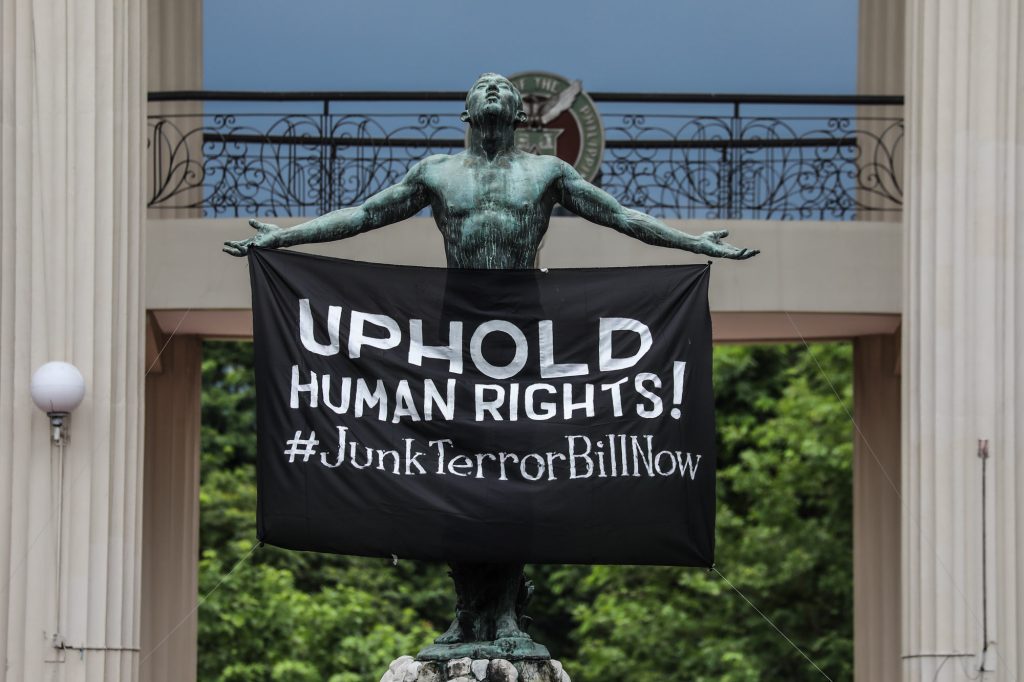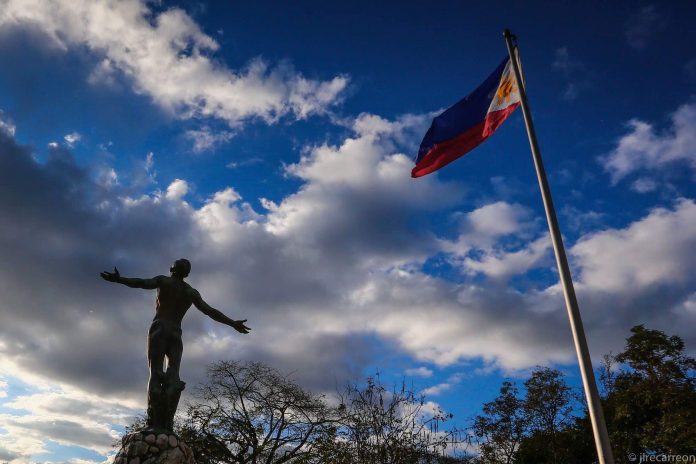If the world today stands in stark contrast with the past, it is for reasons that we sorely lack safe spaces for the exercise of our freedoms.
The University of the Philippines, touted across several political dispensations as a safe space for academic freedom, among other freedoms, is now under serious threat.
The Department of National Defense (DND) has recently abolished the military’s agreement with the said university on the matter of presenting prior notice before police and military personnel can enter the university campus.
The so-called DND-UP Accord was inked on June 30, 1989 and had since been in effect. It is the university’s answer to the growing spate of police brutality against children.
In a letter to the U.P. Regents, Defense Secretary Delfin Lorenzana stresses the military’s role, or so he presumes to be the military’s role, of safeguarding the Filipino youth and the institution from what it alleges as an ongoing recruitment scheme conducted by the Communist Party and the New People’s Army.
To Lorenzana, this supposed recruitment is a matter of national security, thereby the need to terminate the arrangement. To the DND, police and military presence in the said university is all about performing “their legal mandate of protecting the youth.”
Amid this recent development on the ongoing crackdown against insurgents, it is only fair to raise the apparent context for which this agreement is being abrogated: the Anti-Terrorism Law and the recent designation by the Anti-Terrorism Council that the CPP-NPA are terrorists.
As expected, the news of the abrogation rip-roared across various social media platforms. It touched a sensitive chord among alumni of the said university and students of other institutions found in the thick of the struggle for academic freedom.
Our uniformed officers have had a quite a history of dealing with student activists. It is sufficient for this column that the former has long been crippled by a bloody track-record of their own making.
As for the Armed Forces of the Philippines (AFP) top brass, it has been insisting that schools have been the hotbed of communist activity and recruitment, even drafting in 2018 a list of universities supposedly infiltrated by rebel elements. This was in connection with the alleged Red October Ouster Plot against President Rodrigo Duterte.
At this same time, former police chief Director Genenral Oscar Albayalde claimed that there was a move among some instructors and professors in 18 universities to encourage students to join the insurgency movement against the Duterte administration. The list, the AFP later admitted, had not been verified.
What strikes me not only as false, but unbelievably hypocritical, is Secretary Lorenzana’s insistence that the military is the protector and savior of the Filipino youth. If that’s one of his punchlines, I am far from laughing.

There isn’t a sliver of truth to his claim—not a single one—if such is seen under the glaring light of the AFP’s deliberate inaction against China’s invasion of our islands in the West Philippine Sea.
If there is truth to the claim that communists are a serious threat to national security, then shouldn’t we be guarding ourselves against the biggest and ravenous communist of them all—the People’s Republic of China?
With China, the threat is as real as it gets, what with reports of missiles and military hardware being transported to the West Philippine Sea under orders from Beijing’s top brass. The Philippines is within striking distance of these missiles.
Have we forgotten the untold number of times Chinese warships attacked or threatened Philippine vessels plying what is ours to begin with? If so, then why are our soldiers hellbent on invading university grounds when the real threat is out there?
It doesn’t take a military genius to know that this administration’s inaction on the Chinese incursion of our islands is causing tremendous amount of geopolitical tension in the area that could explode in our faces sooner than we expect.
But by then it would be too late to respond, wouldn’t it?
Senior Defense analyst Derek Grossman writes on China’s military buildup in the disputed islands:
“If ever faced with armed conflict in the South China Sea, China has significant naval, marine, coast guard, and maritime militia forces to bring to bear. According to the US Department of Defense, the PLAN (People’s Liberation Army Navy) is the largest navy in the Indo-Pacific, featuring at least 300 ships along with numerous submarines, amphibious ships, patrol craft, and specialized ships.
“The Pentagon further notes that the PLA command in charge of SCS operations, known as the Southern Theatre Navy, maintains in its inventory four nuclear-powered ballistic missile submarines (SSBN), two nuclear-powered attack submarines (SSN), 16 diesel-powered attack submarines, 11 destroyers (DDG), 19 frigates (FFG), 11 corvettes (FFL), three amphibious transport docks (LPD), ten tank landing ships (LST), nine medium landing ships, and 24 missile patrol craft. PLAN modernization also encompasses the deployment of a diverse array of anti-access/area denial (A2AD) capabilities such as ASCMs, ASBMs, landattack cruise missiles (LACMs), and mines as well as accompanying ISR support technologies.”
Indonesia under President Joko Widodo puts a clamp on Beijing’s “nine dash line” by immediately modernizing its military capabilities.
As for the Philippine response, Grossman observes:
“To date, however, there has been little progress on these initiatives. Indeed, although Manila used to have the strongest navy coming out of the Second World War […] it now is ‘one of the weakest (navies), even in the Southeast Asian region.”
While it is true that the Philippines has no military ability to go against China toe to toe, what little courage the military institution can show would go a long way to gaining the respect of the people.
As it is, with the AFP’s abrogation of its agreement with the U.P., it is highly unlikely for the armed forces to even show a modicum of bravado, let alone patriotic duty—unless you’re a hapless student.
This is not only an outrage, but an absolute shame.
What is even more surprising is the timing of the abrogation. Of late, public perception of our police agencies has taken a nosedive, what with several officers being implicated in either rape, murder or drug-related cases in the past four years.
The military has also been involved in several murder cases, including the killing of leaders of indigenous people and farmers suspected of being communists—the Sagay Massacre, for example. There is no lack of news reports on these cases.
If I were Lorenzana, this is the perfect time to take major precautions, knowing that the slightest breach of student rights on campus could further stain the little that is left of the military’s reputation. This can only lead to the furtherance of the insurgency movement.
Debilitating poverty, police brutality, and militarization are but a handful of reasons why insurgency persists. Cliché as it may sound, a dictatorial regime dead set on imposing draconian policies is the fastest, most effective recruiter of insurgents anywhere in the world.
Ferdinand Marcos did it, and now Duterte is poised to do a rerun. With the help of an armed force who cannot tell between a real clear-and-present danger and the threat of fly, it would be an exercise in absurdity to trust the AFP when push comes to shove in the West Philippine Sea.
How a nation treats its children is more than enough commentary of how incapable the latter is of sound thought, to say nothing of compassion.
Joel Pablo Salud is an editor, journalist and the author of several books of fiction and political nonfiction. The views and opinions expressed in this article are those of the author and do not necessarily reflect the official editorial position of LiCAS.news.









